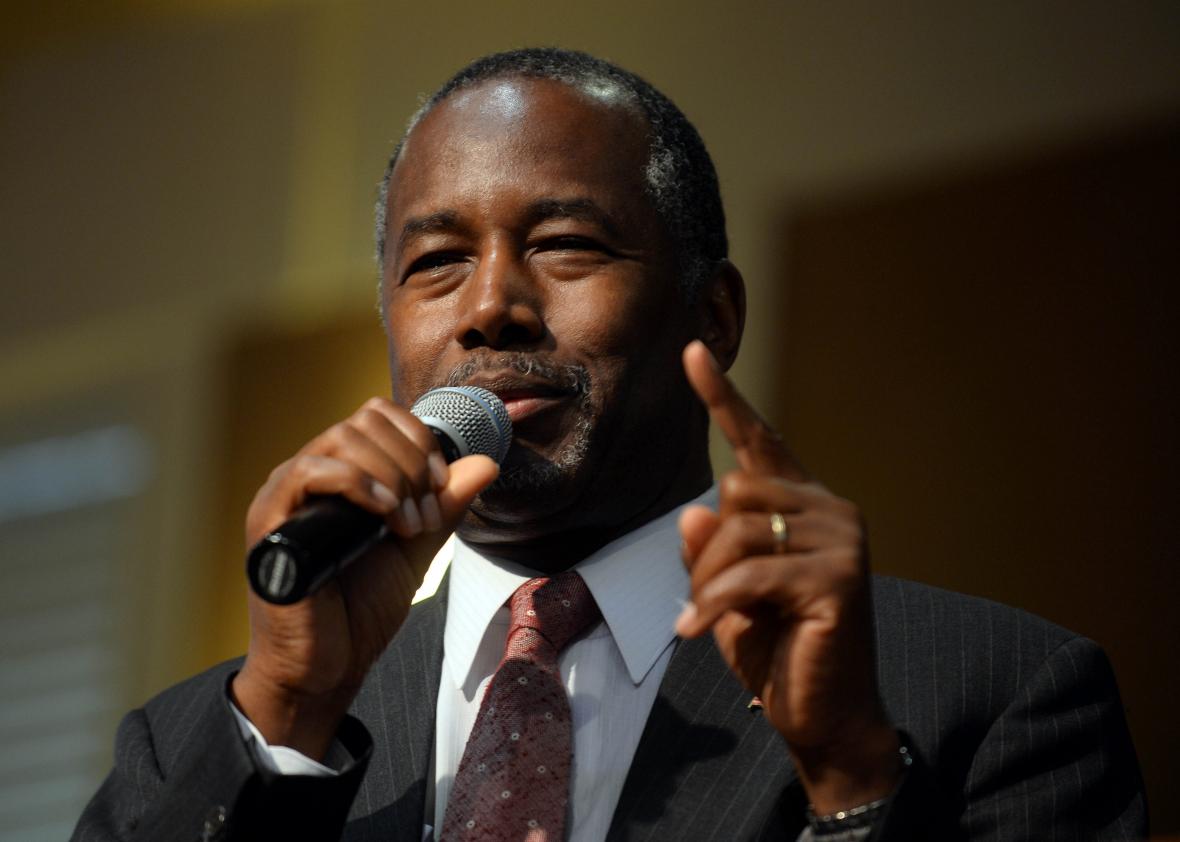Ben Carson Releases Rap Targeted to Black Voters. Like All Campaign Songs, It’s Terrible.

Photo by Darren McCollester/Getty Images
Ben Carson has released what might be described as the 2016 presidential cycle’s first campaign song, a rap his staff is saying is specifically targeted to black voters. ABC News reported on Thursday that Carson would be running the ad, called “Freedom,” in Miami; Atlanta; Houston; Detroit; Birmingham, Alabama; Jackson, Mississippi; Memphis, Tennessee; and Little Rock, Arkansas. In it, Aspiring Mogul raps: “Vote and support Ben Carson/ For our next president and be awesome” and a Carson speech is played over a hip-hop track with backup vocals singing the refrain “Vote!”
ABC reports that the ad is meant to woo “younger black voters.” Carson campaign spokesman Doug Watts told ABC News the campaign was trying to “[reach] them on a level they appreciate and follow and see if we can attract their consciousness about the election.”
It remains to be seen whether or not the message will work for a candidate whose star has risen in the Republican Party partially on the basis of controversial statements like “Obamacare is really, I think, the worst thing that has happened in this nation since slavery” and that the Affordable Care Act “is slavery in a way.”
Lyrics like “If we want to get America back on track/ We got to vote Ben Carson/ A matter of fact” might sound stupid and patronizing, but judged by the standards of other campaign songs it’s pretty much par for the course.
Take for example Jimmy Carter’s 1976 campaign song: “Why Not the Best?” which includes such suboptimal rhyme schemes as “He spoke plain and simple/ and I began to understand/ I was listening to quite a man talking to me/ I began to see.”
Or Richard Nixon’s insanely cheery 1972 campaign song in the midst of the Vietnam War and as the Washington Post was just beginning to unravel his Watergate crimes.
Even the best of these are not great, though. Take Irving Berlin’s famous “I Like Ike.”
The composer of “White Christmas,” “God Bless America,” and “There's No Business Like Show Business” produced one of the catchier campaign tunes and inspired one of the most effective political slogans of all time (because “like” sounds like “Ike”). While the rhyme schemes certainly work, a full version of the song includes such groaners as “I like Ike/ And Ike is easy to like/ Stands alone /The choice of ‘We the People.’ ”
Another relatively good one was John F. Kennedy’s 1960 campaign ad, but it also falls prey to the convention of many others of just repeating the candidate’s name over and over again.
At least there is some originality to these terrible songs, though. As Mark Steyn noted in Slate during the 1996 campaign, “most campaigns eventually [settle] for an ‘INSERT NAME OF CANDIDATE HERE’ approach, shoehorning their man into the handiest existing song.”
No more egregious (and hilarious for 1990s-era Conan O’Brien fans) an example exists than the attempt of the Bob Dole campaign to transform “Soul Man” into “Dole Man.”
One of the original singers of the 1967 version, Sam Moore, actually recorded a full rendition of “Dole Man” for his campaign. Of course, he translated the most famous lyrics from “I’m a Soul Man” to “I’m a Dole Man,” but he also added such Dole-specific verses as “Got where he’s got/ the hard way/ Make America better/ each and every day/ So voters, don’t you fret/ He quit the Senate to be president.” Dole eventually decided to stop playing the song after songwriter Isaac Hayes objected because he didn’t support Dole and wasn’t seeing any royalties. (“I’m sorry if Mr. Hayes is unhappy about that, and I regret that Mr. Hayes, in the words of ‘Shaft,’ can’t dig it,” is an actual quote from an actual presidential campaign spokesman.)
As Steyn wrote at the time, “the song is an exquisite musicalization of the candidate's most frequently cited defect: his campaign's lack of any central theme. 'Dole Man' isn't about anything at all.”
Which is the big problem with all of these campaign songs! The speech being quoted is ostensibly the message of Carson’s ad. But that message is just a string of meaningless clichés. ("I'm very hopeful that I'm not the only one who's willing to pick up the baton of freedom, because freedom is not free and we must fight for it every day," Carson says in the ad. "Every one of us must fight for it because we're fighting for our children and the next generation." Fight. Freedom. Generation. Children.)
Until Carson’s campaign themes move beyond those generic, Trump-ian terms, he might be better off trying the shoehorn approach. We suggest “Get Outta My Dreams, Get Into My Car(son).” Can’t be worse than what he went with the first time.
